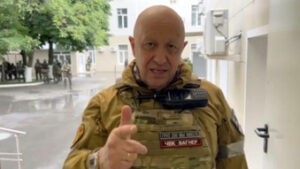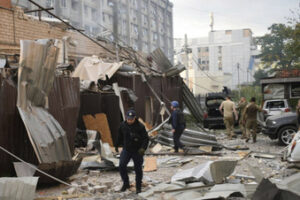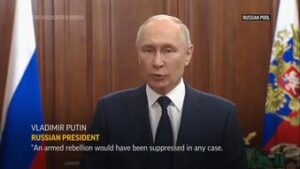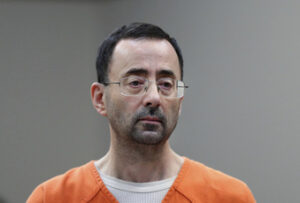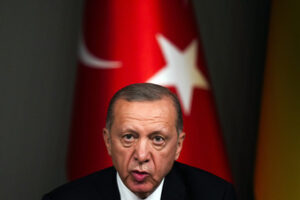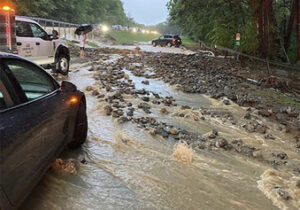Ukraine: Russian strikes thwarted, wreckage hits buildings
4 min read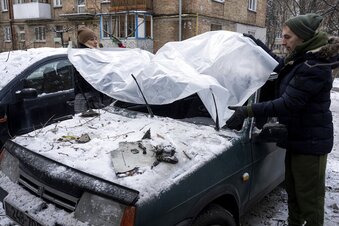
A couple cover their damaged car with a plastic tarp after a Russian attack in Kyiv, Ukraine, Wednesday, Dec. 14, 2022. (AP Photo/Evgeniy Maloletka)
KYIV, Ukraine (AP) — Ukrainian authorities said they thwarted a Russian attack on Kyiv and the surrounding region Wednesday as their air defense system destroyed 13 explosive-laden drones, although wreckage damaged five buildings without causing casualties.
The attempted strikes underlined how vulnerable Ukraine’s capital remains to the regular Russian attacks that have devastated infrastructure and population centers in recent weeks, mostly in the country’s east and south. But they also highlighted Ukraine’s claims of increasing efficiency in intercepting drones and missiles and the possibility that Patriot missiles from the U.S. may further boost defenses.
Ukrainian President Volodymyr Zelenskyy said in a video the “terrorists” fired 13 Iranian-made drones, and all were intercepted. Such drones have been part of the firepower — along with rockets, missiles, mortars and artillery — that Russia uses to target power stations, water facilities and other public utility equipment.
The snow-covered capital remained largely calm after the foiled attack, which occurred around daybreak. As the working day began, authorities sounded the all-clear.
The head of the Kyiv city administration, Serhii Popko, wrote on Telegram that the attempted strikes came in two waves. Wreckage from the intercepted drones damaged an administrative building and four residential buildings, he said.
A blast left the three-story tax office building in the central Shevchenkyvskyi district with a gaping hole in the roof and blew out windows in parked cars and in a neighboring building.
Clean-up crews were on site quickly to shovel away the rubble and roll out plastic sheeting to cover the blown-out windows in freezing temperatures. One man, unfazed, pushed his son on a swingset at a nearby playground as the crews worked.
Another parent, Anton Rudikov, said his family was sleeping when they heard an explosion and smashing windows. “Thank God the children were not affected” beyond their fright, said Rudkov, whose daughters are 13 and 18 years old. But why Russia would attack his neighborhood left him perplexed.
“I didn’t do anything bad to them, but it struck my house. From where? I don’t understand why,” he said.
Residents told Associated Press reporters they saw fragments from a drone bearing the words “For Ryazan.” The Kremlin claims Ukraine was responsible for a cross-border attack last week on a military base in the Ryazan region of western Russia.
Ukrainian authorities have trumpeted their ability to knock down Russian weapons. But strikes in some areas continue to cause deaths and havoc, particularly in areas close to the front lines in the east and south. In the southern city of Odesa, drone strikes temporarily shut off the power last week. Kyiv has suffered comparatively little damage.
During a previous round of Russian volleys on Dec. 5, air defense systems intercepted more than 60 of 70 strikes, including nine out of 10 targeting the capital and the surrounding region, Ukrainian officials have said.
More air defense help was apparently on the way. U.S. officials said Tuesday the United States was poised to approve sending a Patriot missile battery to Ukraine, agreeing to an urgent Ukrainian request. The Patriot would be the most advanced surface-to-air missile system the West has provided to Ukraine to help repel Russian aerial attacks since Russia invaded Feb. 24.
U.S. officials said last week that Moscow has looked to Iran to resupply the Russian military with drones and surface-to-surface missiles.
The damage from Russian strikes has interrupted electricity, heating and water supplies as winter approaches. Yet the U.N. migration agency said more than 5 million people who were displaced within or outside Ukraine since Russia invaded in late February have returned. The International Organization for Migration said a Nov. 25-Dec. 5 phone survey of 2,002 respondents in Ukraine also found that only 7% were considering leaving.
Providing other estimates, Ukraine’s human rights chief said Wednesday that close to one-fifth of the country’s prewar population sought refuge abroad during the war. Dmytro Lubinets said 7.9 million Ukrainian citizens left the country and 4.9 million were internally displaced. Lubinets did not specify how many Ukrainian refugees have returned.
Prisoners of war also were on the move. The head of Zelenskyy’s office, Andriy Yermak, said 64 Ukrainian soldiers and a U.S. national living in Ukraine were released in the latest prisoner swap between Kyiv and Moscow. In a Telegram post, he identified the “U.S. citizen who helped our people” as Suedi Murekezi. Yermak did not elaborate.
What — if any — role Murekezi was serving in Ukraine wasn’t immediately clear. A U.S. official speaking to The Associated Press on condition of anonymity to discuss the Ukraine conflict confirmed Murekezi was released. The official said Murekezi had been living in or near Kherson and Russian forces had detained him.
In other developments Wednesday:
— Ukrainian authorities said they have discovered evidence that children were tortured in areas the Russian army formerly occupied. Lubinets, Ukraine’s human rights chief, said “torture chambers for children” accused of resisting Russian forces were found in recaptured areas of northeastern and southern Ukraine.“There are no limits to the cynicism of the Russian Federation,” he said. Lubinets said he saw two torture sites in Balakliya, in the northeastern Kharkiv region, and spoke with a boy who said he was held for 90 days and cut with a knife, burned, and subjected to mock executions.
— The International Atomic Energy Agency said it has agreed with the Ukrainian government to station nuclear safety and security experts at the country’s nuclear power plants to prevent a nuclear accident. The U.N. nuclear watchdog already has deployed a permanent expert mission to the Russian-held Zaporizhzhia Nuclear Power Plant. The plant, Europe’s biggest nuclear power station, has faced repeated shelling and is the biggest cause of concern, although its six reactors have been shut down for months. Three other nuclear plants are located in Ukrainian-held territory, as is the decommissioned Chernobyl plant.


